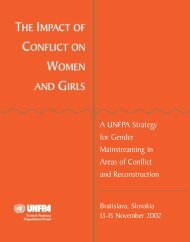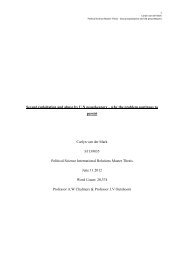Stop Sudah English-revised-March2012 - International Center for ...
Stop Sudah English-revised-March2012 - International Center for ...
Stop Sudah English-revised-March2012 - International Center for ...
You also want an ePaper? Increase the reach of your titles
YUMPU automatically turns print PDFs into web optimized ePapers that Google loves.
In particular, women become vulnerable to sexual violence when wives are used as bait to find the<br />
‘OPM’ and when security <strong>for</strong>ces are allowed to organize dance parties where young women, either<br />
voluntarily or by pressure, are present. The absence of sanctions against security <strong>for</strong>ces that commit<br />
violence against women rein<strong>for</strong>ces the cycle of impunity.<br />
2. Discrimination against women in Papuan tradition and culture result in permittiing violence<br />
against women. The indigenous people of Papua have experienced tremendous changes in a relatively<br />
short time resulting in a shift of traditional values, including the pattern of relationships between men<br />
and women. Violence against women is not a concern or an important part in the life of the indigenous<br />
people themselves. There is no denying that the position of indigenous women in traditional institutions<br />
is still unequal, where women do not have the opportunity to engage fully in decision-making about the<br />
most basic issues related to customs, tribes, families, and individuals. When customs do not favor the<br />
victim, cases of violence against women increase. It is possible that Papuan women can find their own<br />
ways to correct the imbalance, but rapid changes in social life where <strong>for</strong>ces outside the community itself<br />
dominate (the central government, enterprise, migration, trade, liquor, localization of prostitution), mean<br />
that women increasingly lose their space, and are increasingly vulnerable to imbalances in Papuan culture<br />
itself.<br />
Discrimination against women in the domestic sphere of Papuan culture continues in society, among<br />
others, in the division of household labor, in the nurture and education of children in the household that<br />
is a burden <strong>for</strong> women, in ownership and inheritance rights, <strong>for</strong> example, land and decision-making in<br />
the family. This was also found in tribes that dwell in isolated and remote areas/villages that have no<br />
access to the fulfillment of rights, such as <strong>for</strong>mal and non-<strong>for</strong>mal education, to in<strong>for</strong>mation and<br />
technology, or to markets although women <strong>for</strong>m the backbone of the economy. In terms of the impact<br />
on their health, women are particularly vulnerable because of cases of polygamy, and prearranged<br />
marriage where women marry men as arranged according to custom. When subjected to violence,<br />
custom does not protect or side with women, thus there are increasing cases of violence against women<br />
and children. Conversely, in the public domain educated women in big cities have broad access to<br />
decent work, although available employment opportunities are still limited.<br />
3. Natural resource conflict, political conflict, and power struggles from the local to national<br />
levels, foster a situation where both state and domestic violence against women is increasing.<br />
Papua that is so rich in natural resources has become an area of struggle <strong>for</strong> natural resources,<br />
competition <strong>for</strong> political sovereignty, and the struggle of local, national, multinational, and international<br />
interests. Conflicts grow on top of conflicts, the boundaries of interests increasingly blurred. Demands<br />
of mining company employees regarding their rights are manipulated by others to provoke a situation<br />
that ultimately leads to tribal warfare. In the era of Papua’s Special Autonomy, there is consumerism and<br />
abuse of power by those with access to power and Special Autonomy funds so that violence against<br />
women and children is increasing, including cases of sexual abuse, infidelity, and polygamy. Various<br />
<strong>for</strong>ms of violence against women and children occur in regions where there is mining, oil palm<br />
plantations, exchange of aloe lumber, fish industries, and localization of prostituion and entertainment<br />
industries in the cities. On one hand, new industrial centers, such as fish and timber industries, are a<br />
source of economic development that attract workers from outside that, in turn, are a factor driving the<br />
spread of HIV/AIDS as seen in places such as Merauke, Timika, Merauke, Sorong, Biak, and Nabire. At<br />
the same time, new investors employ more outside workers without ef<strong>for</strong>ts to protect the rights of<br />
indigenous people of Papua. In this struggle, indigenous Papua women are increasingly marginalized,<br />
and even become victims of violence in tribal war that then emerges, become vulnerable to HIV/AIDS,<br />
and increasingly experience economic impoverishment, and social and political powerlessness.<br />
4. There is not serious response and political will from the government to resolve the conflict in<br />
ENOUGH IS ENOUGH! 52




![IANSA [PDF, 2MB] - PeaceWomen](https://img.yumpu.com/25206379/1/190x123/iansa-pdf-2mb-peacewomen.jpg?quality=85)
![Commitments Sample [PDF, 93KB] - PeaceWomen](https://img.yumpu.com/25206331/1/190x245/commitments-sample-pdf-93kb-peacewomen.jpg?quality=85)










![A Toolkit for Advocacy and Action [PDF, 260KB] - Peace Women](https://img.yumpu.com/25205989/1/190x245/a-toolkit-for-advocacy-and-action-pdf-260kb-peace-women.jpg?quality=85)